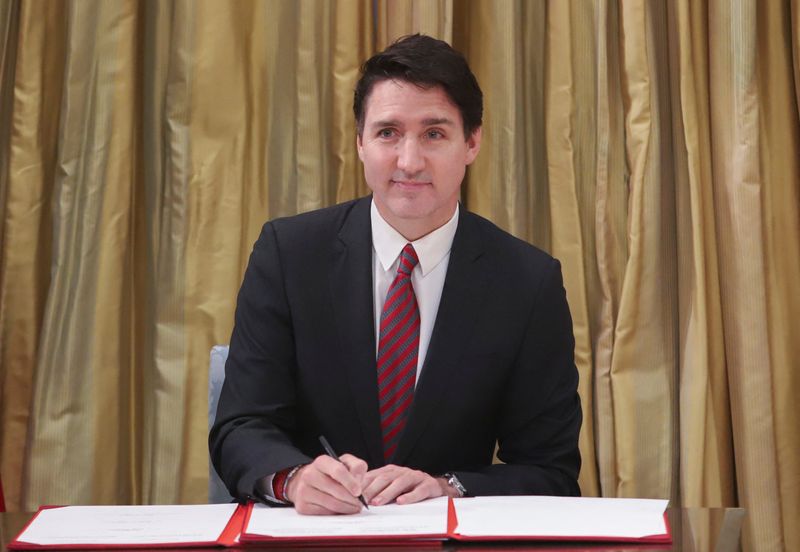By David Ljunggren
OTTAWA (Reuters) -The head of a Canadian political party that has been keeping Prime Minister Justin Trudeau in power says he will vote in favor of a motion of no-confidence, effectively assuring the Liberals will be removed from power early next year.
Trudeau has been under increasing pressure to quit since Finance Minister Chrystia Freeland resigned over a policy clash.
Here are some potential ways forward for Canada:
WHAT HAPPENS IF TRUDEAU RESIGNS?
If Trudeau resigns, the Liberals will name an interim leader to take over as prime minister while the party sets up a special leadership convention. The challenge for the party is that these conventions usually take months to arrange and if an election does occur before then, the Liberals would be in the hands of a prime minister not chosen by members. This has never happened in Canada. The Liberals could try to run a shorter convention than usual, but this might prompt protests from candidates who felt this placed them at a disadvantage.
There is no way Freeland could quickly be named prime minister on a permanent basis, since tradition dictates that the interim leader does not run as a candidate to lead the party.
CAN TRUDEAU BE FORCED OUT BY HIS LIBERAL PARTY?
Unlike Britain, where party leaders are chosen by the parliamentary caucus and can be removed quickly, the Liberal leader is selected by a special convention of members. There is therefore no formal party mechanism to remove Trudeau if he wants to stay.
That said, if members of his own cabinet and a large number of legislators call for him to go, he may conclude his position is untenable.
CAN TRUDEAU BE FORCED OUT BY PARLIAMENT?
Canadian governments must show they have the confidence of the House of Commons elected chamber. Votes on budgets and other spending are considered confidence measures and if a government loses one, it falls. In virtually all cases, an election campaign starts immediately.
The House of Commons closed for the winter break on Tuesday and does not return until Jan. 27. The government can use procedural maneuvers to avoid being brought down on a spending measure but it must allocate a few days each session to opposition parties when they can unveil motions on any matter, including no-confidence.
Assuming the government allocates the opposition days at the end of the session, the most likely time for Trudeau to be brought down would be in the last 10 days of March. This would trigger an election at some point in May.
IS THERE ANY OTHER WAY TRUDEAU CAN BE FORCED OUT?
Ultimate constitutional power in Canada lies with Governor General Mary Simon, who is the personal representative of King Charles, the head of state. She can in theory remove Trudeau, but in real life this would not happen. "The governor general won't dismiss a prime minister who still holds the confidence of the Commons," said Philippe Lagasse, a professor and constitutional expert at Ottawa's Carleton University.

WHAT ELSE COULD TRUDEAU DO TO AVOID BEING OUSTED?
Trudeau could prorogue parliament, which would formally end the current session and give him some breathing space. Under this scenario, the return of the House would be delayed by several weeks, allowing the government to unveil a new plan for how it plans to run the country. This would have the advantage of delaying any motion of no-confidence, but it could further anger Liberal legislators, especially if Trudeau were still prime minister.